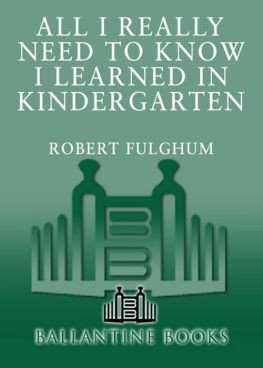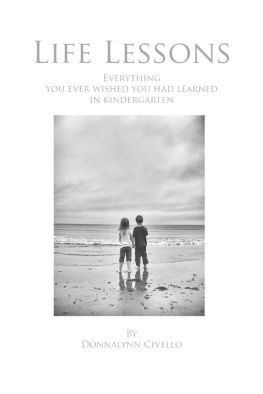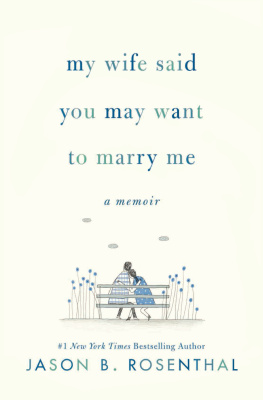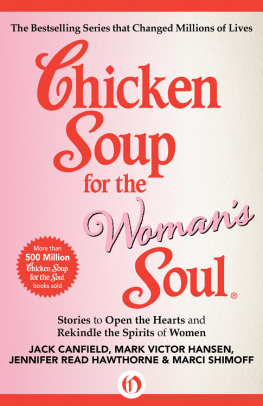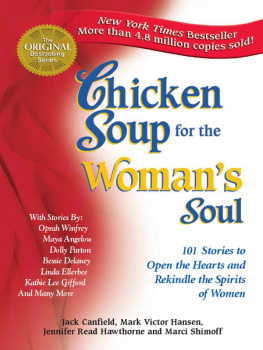Also by Robert Fulghum
It Was on Fire When I Lay Down on It
Maybe (Maybe Not)
Uh-Oh
From Beginning to End
True Love
Words I Wish I Wrote
What On Earth Have I Done?
Third Wish
If You Love Me Still, Will You Love Me Moving?
CODA
MY FAVORITE BOOK ENDING IS not an ending. Its where James Joyce leaves off in Finnegans Wake, in midsentence, without punctuation or explanation. Some scholars believe the last phrase connects with the incomplete sentence that begins the book, implying an unending cycle. I hope its so. I like that.
I have reconsidered, revised, and expanded this book as part of a cycle of rethinking about where Ive been, where I am, and where Im going. If all goes well, I will keep on doing that, and come back to Kindergarten again and
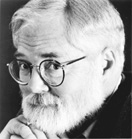
Jenny Bornstein
ROBERT FULGHUM is a writer, philosopher, and public speaker, but he has also worked as a cowboy, a folksinger, an IBM salesman, a professional artist, a parish minister, a bartender, a teacher of drawing and painting, and a father. All I Really Need to Know I Learned in Kindergarten has inspired numerous theater pieces that have captivated audiences across the country. Fulghum is also the author of many New York Times bestsellers, including It Was on Fire When I Lay Down on It, Uh-Oh, and Maybe (Maybe Not), as well as two plays: All I Really Need to Know I Learned in Kindergarten and Uh-Oh, Here Comes Christmas. He lives in Seattle, Washington.

CREDO
To begin with, did I really learn everything I need to know in kindergarten? Do I still believe that? Here is the original essay, followed by my editorial reaction.
EACH SPRING, FOR MANY YEARS, I have set myself the task of writing a personal statement of belief: a Credo. When I was younger, the statement ran for many pages, trying to cover every base, with no loose ends. It sounded like a Supreme Court brief, as if words could resolve all conflicts about the meaning of existence.
The Credo has grown shorter in recent yearssometimes cynical, sometimes comical, and sometimes blandbut I keep working at it. Recently I set out to get the statement of personal belief down to one page in simple terms, fully understanding the nave idealism that implied.
The inspiration for brevity came to me at a gasoline station. I managed to fill my old cars tank with super deluxe high-octane go-juice. My old hoopy couldnt handle it and got the willieskept sputtering out at intersections and belching going downhill. I understood. My mind and my spirit get like that from time to time. Too much high-content information, and I get the existential willies. I keep sputtering out at intersections where life choices must be made and I either know too much or not enough. The examined life is no picnic.
I realized then that I already know most of whats necessary to live a meaningful lifethat it isnt all that complicated. I know it. And have known it for a long, long time. Living itwell, thats another matter, yes? Heres my Credo:
ALL I REALLY NEED TO KNOW about how to live and what to do and how to be I learned in kindergarten. Wisdom was not at the top of the graduate-school mountain, but there in the sandpile at Sunday School. These are the things I learned:
Share everything.
Play fair.
Dont hit people.
Put things back where you found them.
Clean up your own mess.
Dont take things that arent yours.
Say youre sorry when you hurt somebody.
Wash your hands before you eat.
Flush.
Warm cookies and cold milk are good for you.
Live a balanced lifelearn some and think some and draw and paint and sing and dance and play and work every day some.
Take a nap every afternoon.
When you go out into the world, watch out for traffic, hold hands, and stick together.
Wonder. Remember the little seed in the Styrofoam cup: The roots go down and the plant goes up and nobody really knows how or why, but we are all like that.
Goldfish and hamsters and white mice and even the little seed in the Styrofoam cupthey all die. So do we.
And then remember the Dick-and-Jane books and the first word you learnedthe biggest word of allLOOK.
Everything you need to know is in there somewhere. The Golden Rule and love and basic sanitation. Ecology and politics and equality and sane living.
Take any one of those items and extrapolate it into sophisticated adult terms and apply it to your family life or your work or your government or your world and it holds true and clear and firm. Think what a better world it would be if we allthe whole worldhad cookies and milk about three oclock every afternoon and then lay down with our blankies for a nap. Or if all governments had as a basic policy to always put things back where they found them and to clean up their own mess.
And it is still true, no matter how old you arewhen you go out into the world, it is best to hold hands and stick together.

DEEP KINDERGARTEN
AS I WRITE THIS I am sixty-five years old. Not so old, really, but I have been around awhile. Kindergarten is a long way back there. What do I know now?
The Kindergarten Credo is not kid stuff.
It is not simple. It is elemental.
The essay answers the questions asked sooner or later by every one of us who once stared out a classroom window wondering: Why am I here? Why do I have to go to school?
We are sent to school to be civilizedto be introduced to the essential machinery of human society. Early on in our lives we are sent out of the home into the world. To school. We have no choice in this. Society judges it so important that we be educated that we must go. It is the law. And when we get to school we are taught the fundamentals on which civilization rests. These are first explained in language a small child understands.
For example, it would do no good to tell a six-year-old that Studies have shown that human society cannot function without an equitable distribution of the resources of the earth. While this statement is profoundly and painfully true, a child cannot comprehend this vocabulary. So a child is told that there are twenty children and five balls to play with; likewise four easels, three sets of blocks, two guinea pigs, and one bathroom. To be fair, we must share.
Likewise a six-year-old will not understand that By and large it has been demonstrated that violence is counterproductive to the constructive interaction of persons and societies. True. But a child can better understand that the rule out in the world and in the school is the same: Dont hit people. Bad things happen. The child must understand this rule is connected to the first rule: People wont share or play fair if you hit them.
Its hard to explain the cost and consequences of environmental pollution and destruction to a six year old. But we are paying a desperate price even now because adults did not heed the instructions of kindergarten: Clean up your own mess; put things back where you found them; dont take whats not yours.
The history of society is more defined by its understanding of disease than its formulation of philosophy and political theory. True. Basic sanitation. Keeping excrement off our hands as well as out of our minds is important. But its enough to teach a child to use the toilet, flush, and wash his hands regularly.

